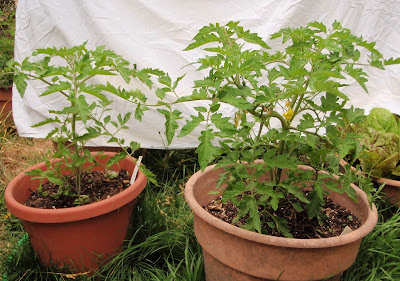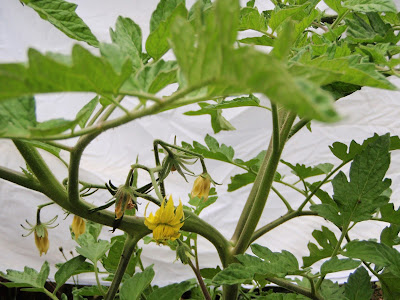Surprisingly, we had actual rain this past week, enough to collect in the bottom inch or two of the various empty buckets and bins that I keep in the back of the yard. It's late in the year for rain in California, but this didn't feel like a California rain anyway; it felt like an eastern rain – a discharge from an atmosphere overloaded with humidity – rather than our regular winter rains, not that I'm sure I remember those all too well anyway. I lived in Boston for eleven years and even at the end of that time, after more than a decade there, it was deeply strange to me that it rained in the summer – that it could be stormy, pouring rain, with dark clouds piled up and not a spot of blue in the sky, and yet 90 degrees.
Our rain last week woke me up around 4:00
AM, which is roughly an hour before my alarm goes off anyway. I enjoyed hearing it fall, though I did get up and shut several windows before getting back under the covers and listening. I love the sound of rain falling. I had a conversation recently with someone who implied, if I understood her correctly, that she disliked the sound of falling rain. I sound uncertain because this seems so improbable to me. But I do know that there are people unbothered by sounds that drive me crazy. Barking dogs, for example: I detest the sound, have had many nights' sleep damaged by it, and would gladly silence every dog in the vicinity. Other people don't even notice it.
The rain meant that I skipped an extra day or two of watering. Things still seem to be progressing nicely, though, and the soil levels in the pots are dropping as the plants expand and use it up. So this week I augmented the compost in the pots with some potting soil (left over from last year). Towards the end of the season I just let the soil levels drop, but this early I try to keep the dirt levels up. Tomatoes are one of those plants that will develop roots out of the stem as up as the soil goes, so it's advantageous to keep them in fairly deep dirt.
I also put some mulch in all the pots, hoping to retain water, cut down on weeds – all the usual mulching reasons. I use cocoa shells, mostly because I like the smell. San Francisco's famous Ghirardelli chocolate, by the way, is actually processed here in San Leandro, and some mornings when I leave my house the air smells like chocolate.
Below we see our duo. Again, Michael Pollan is on the left and Cherokee Purple on the right. The plants are getting large enough so that these double-portraits may not be working anymore.
Below is a closer view of Michael Pollan. Last week he was 18 1/2 inches, measuring from the dirt line to the top of the main stem. This week he shot up to 23 inches, and I measured after adding soil (thereby raising the soil line), so the increase is even greater than the numbers indicate.

There were no blossoms on Michael Pollan last week, but this week there were 13 flowers and around 31 buds. It's actually kind of difficult to count them, and maybe I'm making things pointlessly harder by making a distinction between "blossoms" and "buds" – the dividing line can obviously be vague and a matter of personal judgment. This reminds me of one of the most illuminating science lessons I ever had: in high school biology, we had to take a drop of our own blood (I've been informed this is no longer allowed), put it under the microscope, and try to determine our blood type, using the illustrations in our textbook as a guide. Our smeary slides were much, much harder to figure out than the dapper drawings. The lesson taught me a lot about how blurry real-life science can be, and increased my respect for (as well as, to a certain extent, some skepticism towards) what scientists do and how they do it. I mean, it's tough to make some of these calls, and they're often less definite than the clear-cut sound of the results might make you think.

Above are some of the blossoms on Michael Pollan. I'm trying to figure out how to get clear close-ups with my camera. I think this one came out OK (with some cropping), but I'd like to get closer close-ups.
Below is Cherokee Purple. Last week it was 12 inches high, again measured from the soil line to the top of the main stalk. This week it was 23 inches, and, as with Michael Pollan, that was after raising the soil line. This seems like an improbable increase, but I'm not complaining. It's a much bushier plant than Michael Pollan, with more vines and tendrils, so there's also the possibility that some height has been added because "the top of the main stem" is in a different branch this week. I'm trying to be consistent, but I'm also figuring some of this out as I go along, so . . . I'll just try to keep the errors and variations to a minimum.

The blossoms on Cherokee Purple are even harder to count than on Michael Pollan, because on the latter they're all clustered in one place (so far), whereas they're on several different branches of Cherokee Purple, all over the bush. I counted them twice, so I think I ended up with a fairly accurate count: 30 blossoms, and about as many buds. Last week there were nine blossoms. The photo below was one of my attempts to take a close-up of Cherokee Purple's flowers; as you can see, it didn't quite come out, but I liked the looks of it, so here it is. Kind of a bug's-eye view of the plant.
The flowers on both plants look pretty similar. All my tomatoes have always had similar yellow flowers, and I've noticed when I've grown squashes and peppers (or attempted melons and pumpkins, which never have come out well) their flowers have always been yellow too. What gives? Something to do with a common origin to all these plants? Is there some advantage to them in having yellow blossoms?
Below is a view of the cocoa hull mulch. This tomato is Black Prince, which is flopping out of one side of the pot, thereby providing a better view of the hulls than do the two we're tracking. Frankly, a number of my other tomatoes seem to be doing better than either Michael Pollan or Cherokee Purple – taller, fuller, even starting to bear fruit – but we have to stick with the ones we started with.
Let's get a closer look at those cocoa hulls! Too bad you can't smell their delicious aroma. Yes, I also need to be more vigilant about weeding the pots, as you can see by looking to the right of the photo below.
Remember the heirloom "Freckle" lettuce from
two weeks ago? Look at it now! I guess I'd better gather it before it goes to seed. I have a bad habit of growing stuff and not actually consuming it. I'm trying to get better about that.
Here's another random rose. This is Joseph's Coat, named after the Biblical coat of many colors because of the variegated colors streaking the flowers: reds, oranges, yellows, whites. These are past their prime, but I liked the way they all seemed lined up on the right.
And the apricots are ripening!
I'm glad that tree is producing, because the one that used to be the big producer seems to be dead, as you can see below. I've already cut off about half of the branches. If it doesn't revive next year after being trimmed back, I'll chop it down and put something else there. It didn't seem diseased, and the wood I've cut off hasn't been rotten, so I'm not sure what went wrong. Plants can be very unpredictable. Sometimes it's the plant itself, other times it's just that their position is slightly out of the sun, or in the sun, and that does them in. And of course there is always the slow, sometimes underground damage of this long drought.










































